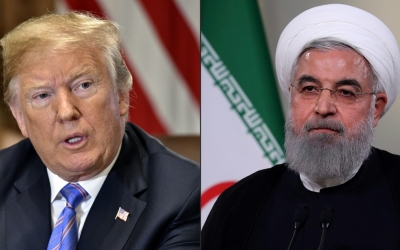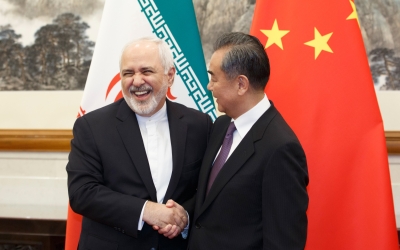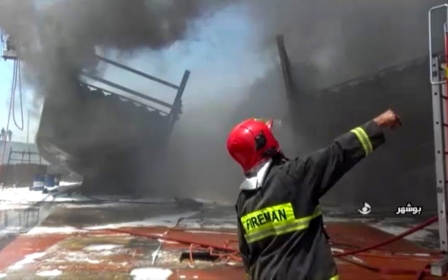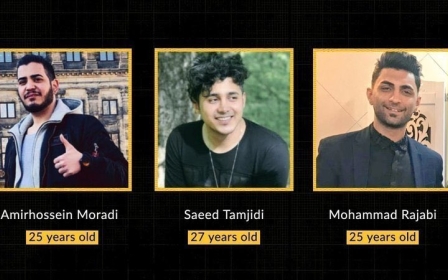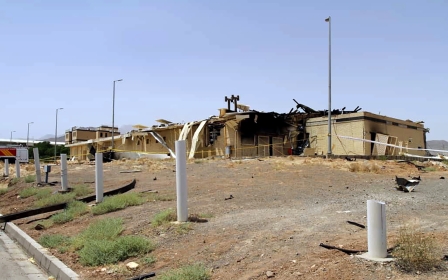Iranian press review: US warship fire sparks Iranian rumours, theories and jeers
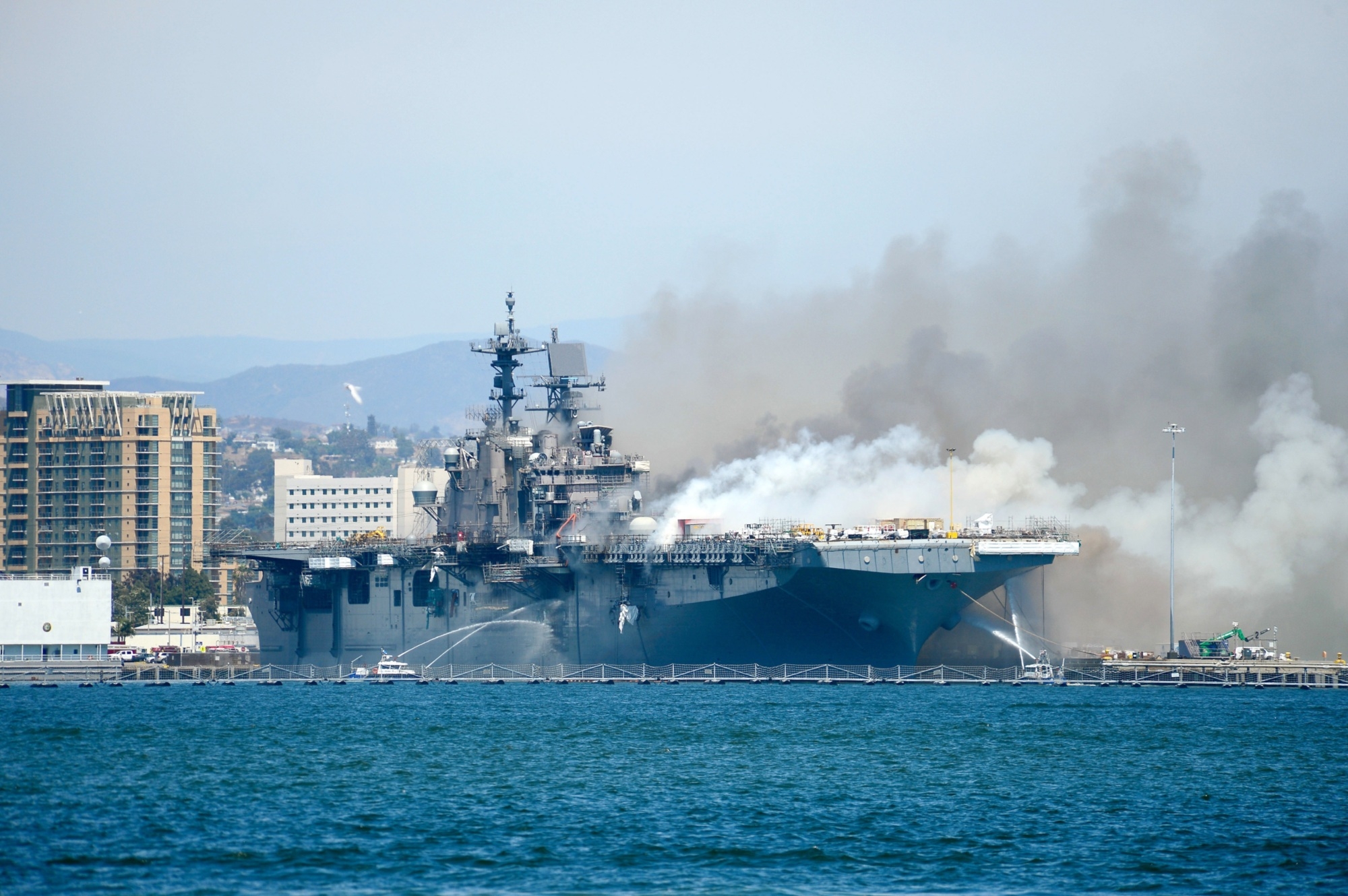
Iranian media pores over US warship fire
Iranian newspapers from across the political spectrum have dedicated their front pages to images of amphibious assault ship USS Bonhomme Richard burning while docked in its home port in San Diego Bay.
On 12 July, an explosion occurred on the US navy ship that set it ablaze for four days.
The US warship fire broke out following several explosions and fires at Iranian refineries, petrol storages and nuclear sites.
Considering the circumstances and timing of these multiple explosions, Iranian papers have openly wondered why international media did not pay more attention to the USS Bonhomme Richard fire.
Under the headline “Explosion in a castle of glass”, pro-reformist daily Etemad quoted Iranian foreign ministry spokesman Abbas Mousavi as saying Iran had no comment to make on the incident.
“But it is interesting to know how rapidly the US warships can be set on fire,” Mousavi added.
Iran, the official paper of the moderate government of President Hassan Rouhani, focused on the probable causes of the fire. The daily quoted a Farsi source that had raised the theory that the explosion could be the result of a cyber-attack or “special operation”.
“Since the US government carries out similar operations against other countries, logically it would be the target of retaliatory operations,” the paper added.
Conservative daily Vatan Emrooz quoted the head of Iran’s Islamic Revolutionary Guard Corps elite Quds force, Esmail Qaani, as saying: “The truth is that the American army is tired and worn out and their military equipment is nothing but pieces of rusty metal.”
China deal deepens political divide in Iran
The revelation of the final draft of a 25-year economic partnership between Tehran and Beijing has intensified political quarrels among Iranian officials and analysts, while US President Donald Trump’s administration has started a propaganda campaign in Farsi against the China deal.
The details of the accord are yet to be officially announced, however, the New York Times claimed that the deal would involve Iran selling heavily discounted oil to China, in return for Chinese investment in Iran’s banking, telecommunication, oil and energy sector.
The New York Times added that the accord, consisting of 100 projects, would be worth $400bn.
On Sunday, the speaker of Iran’s national security and international relations parliamentary committee, Abolfazl Amouey, dismissed the report as rumours, IRNA news agency reported.
Meanwhile, Ensaf News published a 13-page Farsi document purporting to be the final draft of the accord as prepared by Iran’s foreign ministry.
The document revealed that the two states’ partnership in the energy sector would take place in the fields of “crude oil [production, transportation, refinement and security], petrochemical products, renewable energies and non-military atomic energy”.
According to this document, China would also invest in Iran’s transportation system to expand its railways, as well as in a bilateral banking system to use currencies other than the US dollar.
The document published by Ensaf News mentioned no information about specific projects nor the total value of the agreement.
Unnamed sources told pro-conservative daily Khorasan that no document has yet been signed in regards to the accord.
Iranian Foreign Minister Mohammad Javad Zarif also confirmed that the two countries were still negotiating over a final draft and that no deal has yet been made.
According to Khorasan, which praised the attempts to make a deal with China and not the US, the reports about the value of the accord and rumours about selling cheap oil or Iranian islands to China were US propaganda and a part of its maximum pressure campaign on Iran.
Over the last two weeks, the US State Department’s Farsi-language Twitter account has posted several threads accusing Iran of selling its resources for cheap to China. The same narrative has been echoed by the US-funded Radio Farda, as well as Saudi Arabia’s Farsi-language channel Iran International.
While conservative local media and politicians have widely supported the accord and hailed it as an effective policy to turn eastwards for political and economic ties, pro-reformist experts have expressed concerns over the China deal.
Ahmad Zeidabadi, prominent political analyst and former prisoner, warned that the turn to China would not provide Iran the international support that it seeks.
“China attempts to have a warm and balanced relationship with all Middle Eastern countries, particularly with Israel, Saudi Arabia and Iran,” Zeidabadi wrote on Telegram.
“I think [this] strategic agreement with China will change Iran’s foreign policy in general and its regional policies in particular and will make it adhere to Beijing policies,” he added.
In an article critical of the accord, the pro-reformist Shargh daily warned the administration of President Hassan Rouhani against becoming economically dependent on China.
Qasem Moheb Ali, former Iranian diplomat, told the paper it is unlikely that the current draft would lead to a strategic, long-term official agreement between the two countries due to Iran’s concerns over its domestic and foreign policies.
“It seems that the accord is a propaganda means used by Iran and China against rivals such as the US, Saudi Arabia and the United Arab Emirates,” Moheb Ali was quoted by the daily as saying.
Death toll rises as wildfires spread in western Iran
Six volunteer firefighters have been killed in wildfires that have spread over 1,000 hectares of oak forests in the Zagros Mountains in western and southern Iran.
Mohammad Mehdi Hoseini was the sixth volunteer to die, after getting stuck in the middle of fire in the southwestern province of Chaharmahal and Bakhtiari.
According to the Ettelaat daily, a large crowd gathered for Hoseini’s funeral in the small city of Ardal.
Since the end of May, the blazes have spread across forests in the provinces of Chaharmahal and Bakhtiari, Kohgiluyeh and Boyer-Ahmad, East Azerbaijan, Kermanshah, Lorestan and Khuzestan.
On 28 June, Kurdish environmentalists Mokhtar Khandani, Balal Amini and Yasin Karimi died while helping firefighters in the mountain area close to the city of Paveh, in the Kermanshah province, ILNA news agency reported.
Environmentalists operating in this region told ILNA that the fire was started by villagers due to disputes over ownership of trees in national territories.
Volunteers Alborz Zarei, 38, and Mohammad Javad Mokhtari, 31, also died in the last two weeks trying to extinguish wildfires.
*The Iranian press review is a digest of reports that are not independently verified as accurate by Middle East Eye.
Middle East Eye propose une couverture et une analyse indépendantes et incomparables du Moyen-Orient, de l’Afrique du Nord et d’autres régions du monde. Pour en savoir plus sur la reprise de ce contenu et les frais qui s’appliquent, veuillez remplir ce formulaire [en anglais]. Pour en savoir plus sur MEE, cliquez ici [en anglais].


